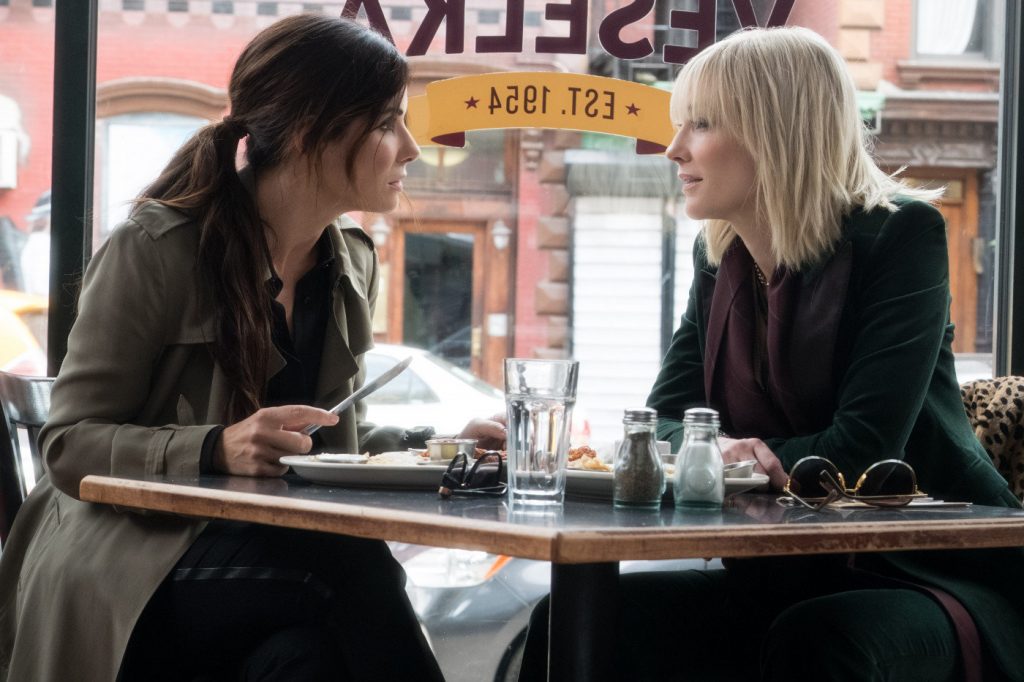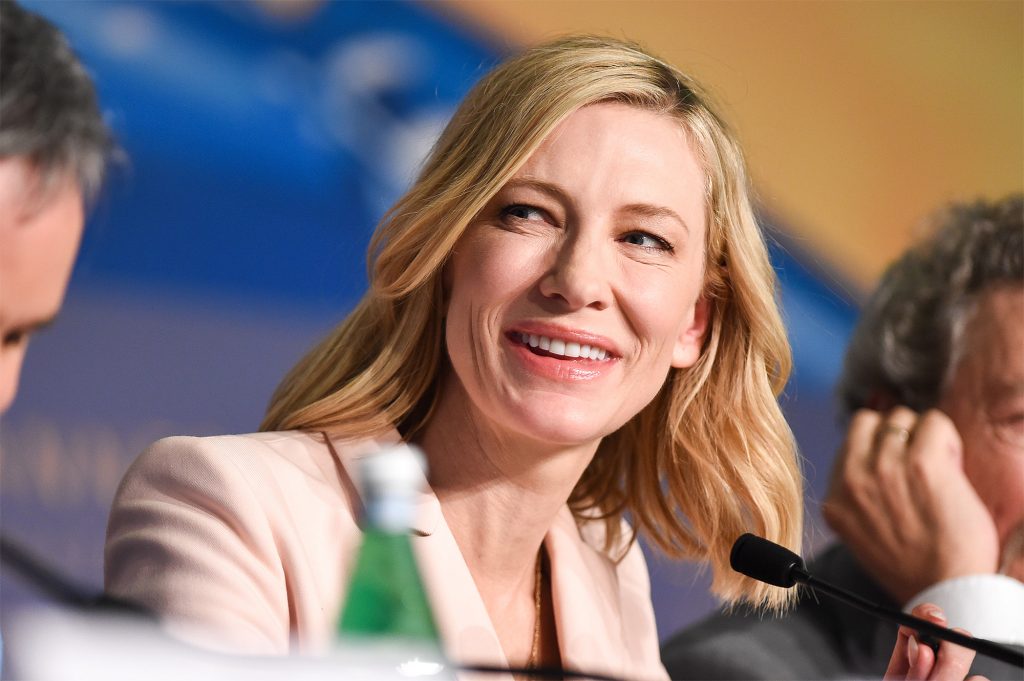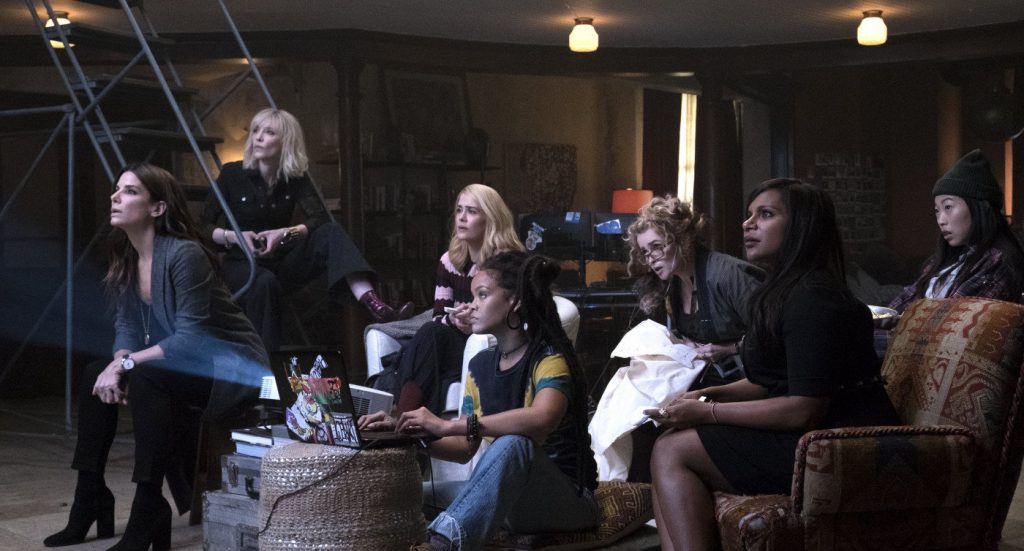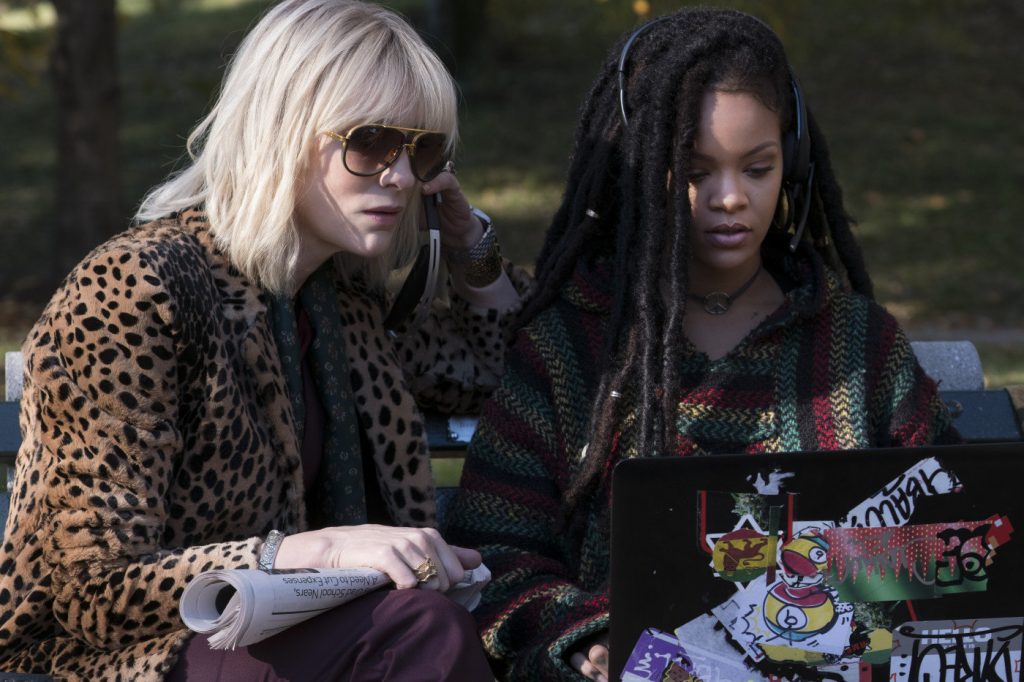Cate Blanchett an ensemble of great actresses appear in Ocean’s 8, which hits theaters in June.

In our interview she talks about the movie, new women’s movements, equal pay, being Jury President of this year’s Cannes Film Fest, which concluded last week.
Organizational Skills–Onscreen and Off
Cate Blanchett: I think something Sandy (Sandra Bullock, co-star) and I share in common being parents and producers and actors and citizens of the world, is that life is a little bit of a military operation.
I think the pleasure in these movies and the “Ocean’s” franchise is the plan is always slightly ridiculous and impossible. And so something always goes terribly wrong and the thrill of it is watching how they get themselves out of the heist and make it work.
It takes different skill sets and that is why it was great to have different actors of such different, who offer such different sort of energies and input. By the way, I am riding a motorcycle, a little wobbly, but I am getting there.

Cannes, France–May 8: jury president Cate Blanchett attends the Jury press conference during the 71st annual Cannes Film Festival at Palais des Festivals on May 8, 2018 in Cannes, France. (Photo by Stephane Cardinale – Corbis/Corbis via Getty Images)
Key Moments in Work and Life
CB: I remember when I was cast years ago in a play right out of Drama School called “Oleanna” by David Mamet opposite Geoffrey Rush at the Sydney Theatre Company, and I wept when I got the job, I thought it doesn’t get any better than this and it’s going to be all downhill from here. And the landscape has changed enormously for women in the film industry and there has been a lot of trailblazing women ahead of me, over me who have paved the way for me and my career as an actress, that you can have a sense of longevity in your career. When I first started out, people were saying make the most of it, cause as an actress, you probably got five years. But I am trying to be an optimist, and the positive thing about that is I have treated every job like it’s going to be my last, so I have tried to relish it, no matter what the size of the role.

Early Career
CB: Early on in my career, I took on roles that actresses turned down because they were girlfriend roles and tried to subvert that cliché and find something fresh it, so I try to make an opportunity out of whatever. But yeah, I feel, particularly with this film, I mean look at them, that’s a fucking jackpot right there. And that doesn’t happen and it’s rare.
Making Ocean’s 8
CB: We made the film awhile back, and even in the last 18 months or two years, the landscape has changed enormously. It still felt like an anomaly, and I think there are so many female-centric films being made, on development slates at the moment. I think there is going to be an explosion. I really felt like we hit the jackpot with the film the other night. We had a fan screening and we popped in and it was a really diverse mix in the audience. And there were men and women and all ages, shapes, sizes and nationalities. This is not a niche film, it’s a great, funny, entertaining tent pole. It’s a heist movie, a caper movie, for men and for women. And so I feel like I have hit the jackpot. And I hope audiences feel the same way.

New Women’s Movement
CB: First and foremost, there is no forefront to this movement, it’s a non-hierarchal inclusive movement that is rolling like a massive rolling stone, bigger than any of the individuals involved. I am in a very public industry, and when one stands up and says anything about anything outside one’s lane, outside the lane of what you are wearing, you are open to criticism. But it’s really important that if you have a platform as an industry as we do, and artists are always moving into places first and they are the first people to buy up Real Estate in areas that no one wants to live in, and it’s the same in the intellectual or political landscape and social landscape. But I feel that it’s upon us to make the changes, the seismic changes we need to make in our industry, so that those, by example, those changes can happen in other industries and less visible industries. Because there is not an industry I can think of, I don’t know about you, where there is equal pay for equal work, or abuse as a power doesn’t exist, for men and for women. And so equality is not a political issue, it’s a human issue.
Unequal Pay
CB: It happens all the time. I mean change is not going to happen overnight. I don’t think women have to be patient, but we certainly have to know that profound changes, and sometimes it happens in a sweep, but lasting change, these things have to be set in stone. And so we just have to know that we are making progress, but it’s not going to happen tomorrow. But I think it’s important that in any industry, where a woman is doing the same job as a man, that they get enumerated equally and it’s not about greed. I have worked on films where I have been paid ten thousand dollars and I have had to put that ten thousand dollars right back into the film, because the film was about to fall over. I didn’t get into the industry to make money, but if my co-stars are doing the same work that I am, then I don’t see why I shouldn’t be paid the same.
Fashion and Red Carpet
CB: It’s easy, I wake up and look like that. No hair and makeup, I do it all myself. What was great, I have had a long creative relationship with a lot of designers, Mr. Armani being one of them, my first, I have probably said this fact a hundred times, my first check from my very first job, I bought an on-sale Armani suit which I still have. What I really wanted to do in Cannes, was wear all female designers. And I love, I have worked in the theater and my sister is a theater designer, and of my best friend is a costume designer for theater and I love costume. So I love collaborating with designers. Elizabeth Stuart is my longtime friend and stylist. It’s great to wear young emerging female designers when you have that platform. And being a woman who has a brain, doesn’t necessarily mean you don’t like dressing up. I do it for a living.
Jewelry
CB: My first piece of jewelry was a Cameo that my grandmother gave me which I still have and wear. Most of my jewelry, all my bits of jewelry, are sentimental, not necessarily expensive. And when I think of Cartier, I think of keep it in the vault, I am too scared to wear it. If I got a $150 million Cartier necklace, I would cut it up and divide it between the have-nots in this world. And there is an increasing number of have-nots in this world.










